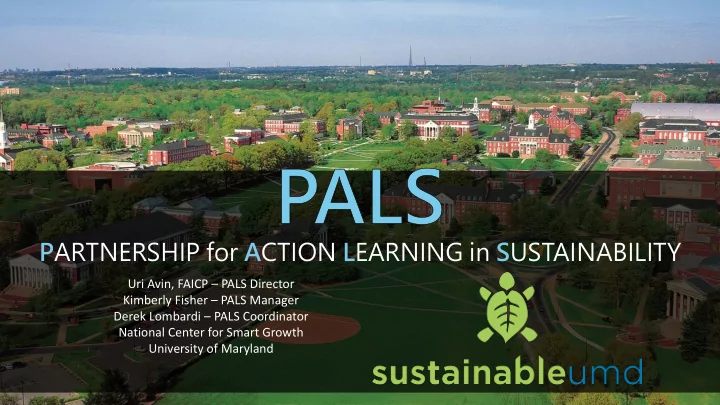

P ARTNERSHIP for A CTION L EARNING in S USTAINABILITY Uri Avin, FAICP – PALS Director Kimberly Fisher – PALS Manager Derek Lombardi – PALS Coordinator National Center for Smart Growth University of Maryland
University faculty have access to and are the creators of the latest evidence from their field of expertise Through applied coursework, students can translate that knowledge to community- identified quality of life issues Students are capable of and encouraged to be riskier and more innovative in their thinking than city staff or local consultants typically can be National Center for Smart Growth | The University of Maryland, College Park
EPIC Network Programs Around the US University of Oregon University of St. Thomas University of Minnesota Penn State University University of Connecticut University University of of Colorado Wisconsin The College of Denver Iowa State New Jersey University University Fresno Utah State of Iowa University of State University Augustana Maryland University College San Diego State University UNC Chapel Hill University of Tennessee Texas A&M University University Number of Courses of Texas Austin 1 to 10 University of South 11 to 20 Florida 20 to 29
12 Key Tenets of the EPIC Framework University/ Utilize Deliberative Projects Scaled for Faculty Community existing selection of by impact opt-in Partnership courses community consensus Students Advance Multi- Defined Defined Mutual actively social disciplinary geographic time limit investment engaged good approach focus National Center for Smart Growth | The University of Maryland, College Park
What is PALS at UMD? National Center for Smart Growth | The University of Maryland, College Park
“Personally, the connection PALS made to project opportunities and city personnel made a big difference in my ability to communicate important concepts about cultural and ecological design.” – Chris Ellis, faculty “…working closely with Frederick's planning board, planning director, transportation director, built confidence in me that I have real skills now that are marketable and can be put to good use in socially and environmentally progressive projects.” – Student
Frederick (2014-15) 300 Students, 25 courses Howard County (2015-16) 520 Students, 30 courses College Park (2015) 75 Students, 4 courses SW Baltimore (2015) 25 Students, 2 courses Anne Arundel County & Annapolis (2016-17) 120 students, 26 courses Mou ount Royal Co Community Ba Balt ltimore (2 (2016-17) 20 Students, 2 courses
Project Spotlights: Environmental Sustainability Designing multi-purpose recreation spaces while protecting wetlands Improving solid waste Promote strategies that mitigate hazards practices in College Park
Project Spotlights: Economic Sustainability C-2 property assessment and redevelopment plans Examining the economics benefits of historic Architectural walking tour building restoration and preservation to promote city amenities
Assessing needs Project Spotlights: and improving Social Sustainability communication with the immigrant community along the Golden Mile Making place through Mapping assets and opportunities public art and design in Southwest Baltimore
Setting Expectations Community University Will ‘expand the conversation’ (but not consultants) Commitment / Time / Energy Requires a range of classes and quality work products Need accessible materials Need forums of engagement More involvement = better results Commitment / Time / Energy Engagement of agencies and local constituencies Good press National Center for Smart Growth | The University of Maryland, College Park
Ingredients for Success • Large land grant university, big graduate program and research mission • A core group who understands University and local gov’t • University support at highest levels • Communications/PR • Consistent funding sources over time • Enough local gov’ts close by who will want these services • Program dissemination networks to recruit faculty National Center for Smart Growth | The University of Maryland, College Park
Securing Community Partners • Pitch the value add (capacity, cutting edge, energy) • Explain breadth (not a typical service-learning experience) and depth (time and monetary value) • Set reasonable expectations + project scopes • Buy-in from leadership • Projects in work plan • Genuine sustainability interest • Funding availability National Center for Smart Growth | The University of Maryland, College Park
What PALS provides + expects Faculty PALS $1500 per course Attend sharing and learning events with facilitation by campus teaching Cover course expenses excellence staff Logistics support Develop customized syllabi which are part of the UMD/Jurisdiction MOU Style templates + editing Sign a LOU with NCSG about course and Syllabus review + templates mutual responsibilities Events and promotions National Center for Smart Growth | The University of Maryland, College Park
“It’s an incredibly exciting project. It’s just what we should be doing in our teaching.” – Mary Ann Rankin, Provost of the University of Maryland “Now that we’ve seen some of the work products from the classes, I think it is some of the best bang for the buck.” – Kelly Russell, Alderman, Frederick, MD. “Being able to pull off these fresh ideas, the fresh mindsets and the new information is really valuable for us.” – Jenny Willoughby, Sustainability Manager, Frederick, MD. National Center for Smart Growth | The University of Maryland, College Park
Your potential … your challenges • What would be your necessary ingredients to successfully launch and sustain an EPIC program? • What challenges would you expect to encounter? National Center for Smart Growth | The University of Maryland, College Park
Recommend
More recommend